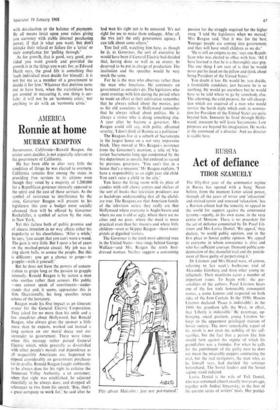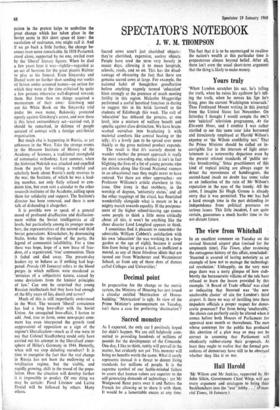Act of defiance
RUSSIA TIBOR SZAMUELY
The fifty-first year of the communist regime in Russia has opened with a bang. Never before, from the moment Lenin seized power, through all the years of terror and 'relaxation' and revived terror and renewed 'relaxation,' has a Russian citizen had the temerity to appeal to the world for support against the communist tyranny—openly, in his own name, in the very centre of Moscow. There is no precedent for the act of defiance committed by Dr Pavel Lit- vinov and Mrs Larisa Daniel. 'We appeal,' they declare, 'to world public opinion, and in the first place to Soviet public opinion. We appeal to everyone in whom conscience is alive and who has sufficient courage. Demand public con- demnation of this shameful trial and the punish- ment of those guilty of perpetrating it.'
Dr Litvinov and Mrs Daniel were, of course, referring to last week's barbarous trial of Alexander Ginsburg and three other young in- tellectuals. Their manifesto raises a number of important issues. To begin with : the per- sonalities of the authors. Pavel Litvinov bears one of the few truly honourable communist names, a name famous and respected on both sides of the Iron Curtain. In the 1930s Maxim Litvinov declared 'Peace is indivisible'; in the 1960s his grandson tells the West, in effect, that 'Liberty is indivisible.' By parentage, up- bringing, social position, young Litvinov be- longs to the uppermost privileged stratum of Soviet society. The most remarkable aspect of his revolt is not even the nobility of his self- sacrifice, but the fact that a person like him should turn against the regime of which his .grandfather was a founder. For when he calls for the punishment of the guilty men he does not mean the miserable puppets conducting the trial, but the real instigators, the men who, as he himself says, had decided the sentence beforehand. The Soviet leaders and the Soviet regime stand indicted.
Larisa Daniel is the wife of Yuli Daniel, who was sentenced almost exactly two years ago, together with Andrei Sinyaysky, in the first of the current series of writers' trials. Her partici-
pation in the protest helps to underline the great change which has taken place in the Soviet scene in this short space of time: the escalation of resistance, one might call it. And if we go back a little further, the change be- comes even more remarkable. In 1958 Pasternak stood alone, supported by no one, reviled even by the 'liberal' literary figures. When he died a few years later it was—rightly—regarded as an act of heroism for the great pianist Richter to play at his funeral. Even Sinyaysky and Daniel went no further than sending out works of fiction under assumed names—an action for which they were at the time criticised by quite a few persons otherwise well-disposed towards them. But from then on things acquired a momentum of their own : Ginsburg sent out his White Book on the Sinyaysky trial tinder his own name, Bukovsky protested openly against Ginsburg's arrest, and now there ii this latest extraordinary act—carried out, it should be remarked, in defence of people accused of contact with a foreign anti-Soviet Organisation.
But much else is happening in Russia, as yet unknown in the West. Take the strange' events in' the Moscow Institute of History of ' the Academy of Sciences, 'a traditional stronghold of communist orthodoxy. Last summer, when the historian Nekrich was attacked and expelled from the party for writing a truthful and scholarly book about Russia's early reverses in the war, the Institute, of which he was a lead- ing member, not only flatly refused to con- demn him, but even sent a circular to the other research institutes of the Academy, calling upon them for solidarity and support. The Institute's director has been removed, and there is now talk of disbanding it altogether.
It is possible now to speak of a general mood of profound disaffection and disillusion- ment within the Soviet intelligentsia at all levels, but particularly among its younger mem- bers, the representatives of the second and third Soviet generations. Khrushchev, by denouncing Stalin, broke the mystique of the party, the legend of communist infallibility. For a time there was hope, hope of a new lease of free- dom, of a regenerated, 'true' communism. Then it faded and died away. The present-day leaders try to behave as if nothing had hap- pened. Pravda (10 January) refers to the blood purges in which millions were murdered as 'mistakes of a subjectivist nature, caused by some deviations from the Leninist principles of law.' Can one be surprised that young Russian intellectuals feel they have had enough of the fifty years of lies, deceit and terror?
Much of this is still imperfectly understood in the West. The western 'liberal' conscience has had a long love-affair with the Soviet Union. An unrequited love-affair, I hasten to add. And, true to form, some newspaper com- ment has even interpreted the growth (and suppression) of opposition as a sign of the regime's liberalisation—much as if one were to say that Colonel Stauffenberg could only have carried out his attempt in the liberalised atmo- sphere of Hitler's Germany in 1944. Honestly, when will we stop deluding ourselves? It is time to recognise the fact that the real change in Russia has not been the mellowing of a totalitarian regime, but the visible, and rapidly growing, shift in the mood of the popu- lation. How the situation will develop further it is impossible to predict. Of one thing we may be certain: Pavel Litvinov and Larisa Daniel will be followed by others. Many others.



































 Previous page
Previous page